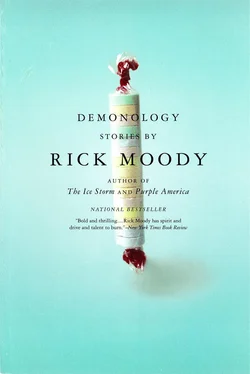Since I was a strapping young man of well over two hundred pounds, closer to two-fifty, to be honest, I was a kind of missile being propelled forward, when the train stopped, ready to squash just about anything or anyone. I fell across the two-seater there, into the lap of a woman. She was irritated at first, she didn’t know where we were, in the circle of creation reserved for dismemberment and sorrow, the realm of severed limbs, of triage, and she pushed back against my commodious bulk, Move, goddamit. I said, Hey, excuse me, I’m really sorry, hell. Then the woman in whose lap I had parked my large, soft posterior called weakly across the car to an MTA employee who powerlessly inhabited our car, standing nearby, Is someone on the tracks? The older woman stared across the car at the gathering of official presences outside, at the crowd beginning to gather around our train. Iknew he was gonna do it. A small Hispanic boy said, clutching at his mother’s hand, What happened? What happened? What happened? His mother shook her head.
A long two or three minutes we were locked inside, in our stationary subway car. There were faces pressed up against the outside, a wall of faces, and these faces would look down into that space under the train, never satisfied until they had apprehended why, and then their faces would knot uncomfortably at what information they now possessed. I resolved that I wouldn’t be one of these people, one of those who had to see. When the door at the end of the car was at last opened from the platform by a man with a high-visibility vestment, people filed off, and the announcement began to cycle on the P.A., lasshnnrnd genmhhnhnssbrs… What a processional, all of us filing out, Before him went the pestilence, burning coals went forth at his feet, by arrangement of Excellent Destiny, the woman I had nearly crushed touched me on the arm, beside me now, in the queue, Do you think he’s all right?
I thought, since I experienced trauma as a convulsion of the imagination, Who’s the guy’s mother and what did he have for lunch and did he ever drive a hydrofoil and did he ever feed a dolphin and how old was he when he lost his virginity and did he know the difference between a coniferous tree and a deciduous one and who was his favorite Yankee and did he know the table of the elements and how many women did he love and who were they all and are they all happy and did they do the things they wanted to do and did he have a kid brother and did he ever play a musical instrument and what is the woman he was meeting thinking right now and what is his mother thinking and is his head separated from his neck or his leg separated from hip, his inner organs like stew upon the undercarriage of the express? Of course, I knew the answers to these questions and knew the answers to others, too, through my sophisticated foreknowledge, even if my step was unsteady, even if I felt like I might pass out. I made reply to the woman; I said poetical words that had only recently occurred to me, Ihave a couple of tickets to the Knicks, they’re about to lose to Philadelphia, but I won’t tell you the score. I was going to sell one of the tickets anyhow.Let’s make something good out of something bad. I had never ever asked a woman out before.
The emergency guy at the door remarked, Let’s get a move on, pal, we got a situation.
My wife, because that’s who she was, my solace, my destiny, my respite, because that’s the substance of what I am telling you, detrained, but she froze on the platform, shoulders trembling suddenly as she held a pulped tissue to her nose, and crowds surrounded us, a gathering of disgruntled New Yorkers, getting home late from the office, or trying to get home late, while down the stairs came the paramedics, with their stretchers. In every part of this story, the stretcher-bearers eventually come. To my wife, I said, No big deal, if its too sudden. I’d understand. I just don’t feel right tonight. I don’t feel like being alone.
What kind of woman was she? What kind of woman was it who called to me from that calamity on the Seventh Avenue line? What kind of woman do I love now, with a fealty that will not cease, not till my occluded arteries send their clots up to the spongy interiors in my skull and I go mute and slack? I love the kind of woman whose hair has gone gray in a not terribly flattering way, the kind who doesn’t even notice how she keeps having to buy larger jeans, the kind who likes big cars because she doesn’t like to be uncomfortable. I love this woman because she is gifted with astounding premonitory skills: no matter how uncertain, how despondent, how lost her mate feels, no matter how dire the circumstances, she nonetheless predicts that Everything will be roses.
She gave me her number. On the fortieth day of our acquaintance, I proposed.
Soon I was living near the water in the Bronx. Not far from City Island. What I loved about that part of the world was how the swamps persisted long after the city planners had tried to do away with them. Co-Op City rising out of the swamps, the cattails and the trash, the Bruckner Expressway kids actually attempting to fish in the rivers — unwor-ried about hepatitis, unworried about PCB’s. Old unsteady docks, skiffs that leaked, a clustering of powerboats, all in the shadow of low-cost housing. My wife and I were newly-weds in our little place with the screened-in porch in back and the quarter acre, and I had just got this job on the retail desk, where I attempt to persuade regular folks to gamble away their meager savings. Every day since I was trained I had known I was going to lose my job, and sometimes for weeks at a time I wouldn’t allow my wife to touch me because I was so disgusted with who I was, with the bands of useless pork on me, with my fulsome breasts, with my joyless prognostications.
You might be wondering why my brother hasn’t turned up in these prophecies until now. Any idea what it is like to grow up the homely older brother of the most gifted, the most talented, the most revered kid on your block? Any idea what it is like to look at the basketball hoop in the driveway and to see your brother sailing past it, in slow motion, grinning an unspeakable grin, dunking the ball with his offhand, finishing a soda, lighting a firecracker, all at the same time, while the Cosa Nostra kids from up the block curse under their breaths for having again lost the two-on-one? Any idea what it’s like having your own brother beat you in a drug deal in which he sells you a mixture of oregano and fresh basil and then, to give credence to his salesmanship, smokes some of it with you and comments on its potency?
My brother Jack refused to speak to me in the cinder-block halls of New Rochelle High, unless these halls were empty, unless we were alone, and even then he would answer only yes or no to questions having to do with what time we were to be picked up, or the hour of a certain dentist appointment. My brother carried a golf club everywhere he went, a seven iron, and swung at me with it. My brother swiped twenty dollars from my mother’s purse, to wager on the ponies, brought back forty dollars from O.T.B., put the twenty back in her purse, left a ten in the offertory plates at Mass on Sunday. My brother never liked me, as he never liked American cars, black jeans, health foods, girls without makeup. My brother Jack never liked to talk about what didn’t go his way, or about our father, or about my second sight. He was handsome. He liked tailored suits. He liked his socks to match his shirt.
I am well pleased with my two sons, my mom said wearily, when the two of us fought, like the time I chased him around the entire house with an ax, threatening, cursing him/swinging the ax, I’m going to bury this thing in your skull, and then I’m going to watch your brains run out and I’m going to eat your brains. He locked himself in the bathroom, and I was banging on the door with the dull side of the ax, until I had managed to put the ax through the door, and he was yelling, Christ, he’s insane, Mom, can’t you get him to back off; my mother waited patiently, until the hitch in my swing, the dormancy in me, when I turned to her, Why has everything been so easy for him?
Читать дальше












